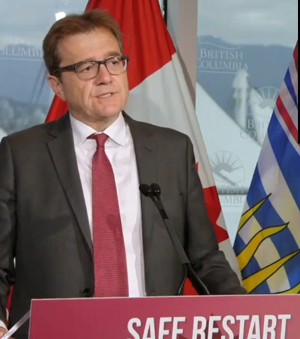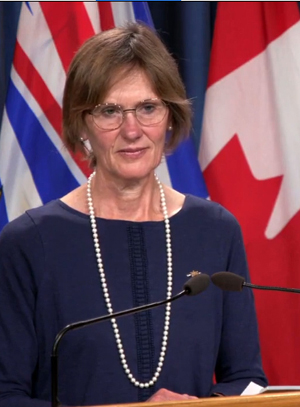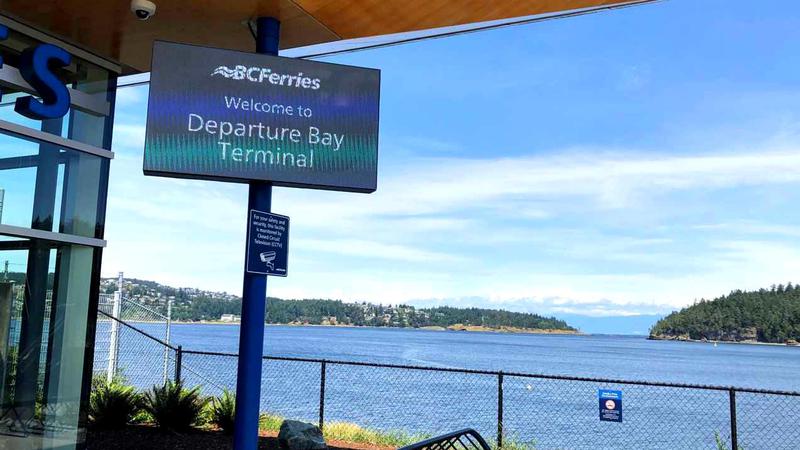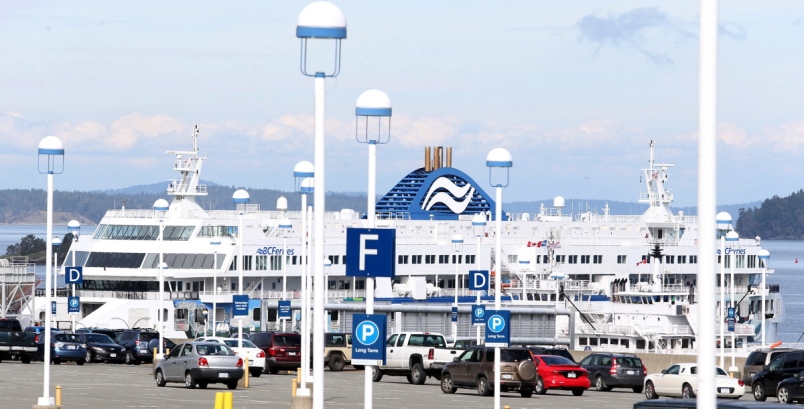Tuesday August 11, 2020 ~ VANCOUVER & VICTORIA, BC
by Mary Brooke, editor | West Shore Voice News
The federal and provincial governments have confirmed that the transit funding envelope of the Safe Restart Agreement will include eligibility for BC Ferries.
The other two key recipients of funding package will be TransLink in Metro Vancouver and BC Transit with services across the province.
The agreement recognizes the ferry service as part of the highways network in British Columbia.
Funding is available jointly through federal and provincial governments.
Announcement bridged the waters:

The announcement was made this morning in a joint teleconference from Vancouver with Jonathan Wilkinson, federal Minister of Environment and Climate Change; Patrick Weiler, MP for West Vancouver-Sunshine Coast-Sea to Sky Country; and Claire Trevena, B.C.’s Minister of Transportation and Infrastructure participating from the Victoria press theatre.
Trevena lauded the federal government for stepping up to include BC Ferries, saying the federal government has been a true partner and thanking them for expanding federal eligibility to include BC Ferries.
Helping communities recover from the effects of the COVID-19 pandemic is a key part of the Safe Restart Agreement. The agreement was first announced on July 16, 2020 by the federal government.
“British Columbians from all corners of the province rely on BC Ferries for safe transit to get to work, visit loved ones and explore B.C.,” said Catherine McKenna, federal Minister of Infrastructure and Communities in a statement. “The Safe Restart Agreement, a partnership between the federal government and the Government of B.C., will ensure BC Ferries continues to provide these essential services.”
Public interest expected to be at core of BC Ferries proposal:

Today Minister Trevena was very clear as to how she expects the public interest to be part of the upcoming BC Ferries proposal for their expanded services during the pandemic.
“The provincial government’s decision on how to apply a portion of the federal funding for BC Ferries, along with its own matched funding commitment, will be based on considerations that put the public’s interest first,” it was stated in a BC MOTI release. That implies there should probably be no rate increases.
This sort of messaging is a reminder that BC Ferries is a private corporation, hopefully guided by political input in the sense of serving the needs of the population as well as the corporate shareholders.
Statement from BC Ferries:

BC Ferries has lost $130 million this year so far due to a significant drop in ridership due to the pandemic. In the first phase of the pandemic, ridership (vehicles and passengers) was down 80% compared to a normal year.
BC Ferries President and CEO Mark Collins said afterward in a statement that “BC Ferries has been collaborating with both levels of government over the past several months regarding the significant impact of the pandemic on the coastal ferry system”.
Collins adds” “BC Ferries has delivered safe, affordable and reliable lifeline ferry service to coastal communities throughout the pandemic, operating in the public interest regardless of financial losses.” The on-water transit provider has maintained ferry system capacity at approximately 20% higher than demand in recent weeks, to ensure access for essential goods, workers, travellers and residents. Collins states that BC Ferries “will continue to do so”.
There have been no COVID-19 exposures on BC Ferries, Collins said, based on BC Ferries communications with public health authorities.
Diverse transportation needs in BC:
Minister Trevena said that BC has diverse transportation needs. Federal Minister Wilkinson said that ferries are a “fundamental reality” in the transportation network in BC.
“The way that Translink is important in lower mainland, to get around, go to jobs, and take care of families — ferries are similar for coastal communities. It’s entirely appropriate to consider the needs for all residents, not just those in big cities,” Wilkinson said today.
Supporting coastal communities:

Trevena says the BC government’s expectations are that BC Ferries ensure fares remain affordable through the pandemic recovery and that essential ferry service is maintained. She said that the public needs to continue to be able to access appropriate, safe and reliable transportation to and from coastal communities.
“Ensuring BC Ferries’ eligibility for Safe Restart funding reflects our shared values on the importance of our transit and ferry systems to the health of B.C. communities,” said Claire Trevena, B.C.’s Minister of Transportation and Infrastructure. “This is another example of the positive relationship we have with the federal government. By working together in response to the impacts of COVID-19, we can ensure essential transportation is available to support a safe restart of the B.C. economy.”
Task force gets down to work:

The provincial government is working closely with BC Ferries and other transportation agencies, such as TransLink and BC Transit, to fully understand the operational and financial challenges resulting from the pandemic before determining what level of relief may be considered. This includes any plans to safely return to pre COVID-19 service levels.
A task force with representation from the provincial government, the BC Ferry Authority board and BC Ferries Services Inc. board is working to ensure that when BC Ferries is ready to bring forward a comprehensive relief proposal to the Province, all necessary information is made available to support the government’s decision.
Pandemic presents unprecedented challenges:
“The COVID-19 pandemic continues to be an unprecedented challenge for our province, including our essential transportation agencies,” Trevena said.
“As we work towards a funding relief decision, I expect BC Ferries to focus its attention on priority areas of public interest, including restoring service levels, keeping fares affordable and delivering a safe and responsible restart from the pandemic.”
$1 billion price tag:
The Province has earmarked up to $1 billion of additional provincial spending targeted to addressing COVID-19 impacts and restart plans of local governments and public transportation services. This funding is conditional on matching federal contributions, with 50-50 cost sharing under Canada’s Safe Restart Agreement.
![Hon John Horgan, MLA [Langford-Juan de Fuca]](https://islandsocialtrends.ca/wp-content/uploads/2020/04/LFDJdFConstituency-WSVN-covid-banner-728x90-web.jpg)



